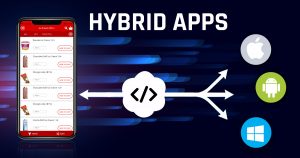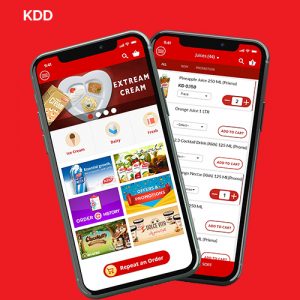Hybrid mobile apps can work across multiple platforms, and offer a balance between accessibility, UI depth, performance speed and turnaround time.
An app development company may recommend going the hybrid app development route if your goals are to reach a broader user base, validate your concept/collect user data more efficiently, and save money by reducing development and maintenance costs without sacrificing quality. For a more in-depth introduction to hybrid mobile apps, check out our previous blog on the subject.
By building a hybrid app through a sophisticated app development framework, you can access many of the premium features usually reserved for native apps.

If you decide to build a hybrid mobile app, the next step will be to choose what development tools with which you want to build your app. We will cover 4 of the top trending hybrid app frameworks in technical detail below.
- Flutter:- Flutter is Google’s hybrid app UI toolkit/SDK, and is particularly hot on the market now. Flutter is an open-source framework which runs from a single code database, and has a reputation for building beautifully-rendered and high-performance applications. Flutter utilizes the programming language Dart, which Java and JavaScript coders can understand fairly easily. Flutter also has built-in widgets (or development tools) which help in adding navigational components, different fonts, custom icons, scrolling tools and more.
- React Native:- React native, an open-source and cross-platform framework developed by Facebook (and used by both Facebook and Instagram), has a reputation for being the best programming framework for JavaScript users. React Native has a JavaScript library for building UI, and renders JavaScript code into native code, facilitating a hybrid app’s conversion into, basically, a native app. Another notable strength of React Native is its image and video-editing capabilities. You can also write in Swift, C and Java within React Native.
- Ionic:- Ionic is another cost-free and open-source framework which can create apps accessible to iOS, Windows and Android devices. Ionic is an SDK for HTML5, though the framework works with CSS, HTML and JavaScript as well. Ionic focuses on the design, feel and UI of an app. Some of the UI tools you can play with in Ionic include superior typography and fonts, high-performing interactive elements, pre-fab themes, visually-pleasing filters, and intuitive navigation menus. Ionic also has a reputation for being easy-to-use for programmers, as it can integrate with multiple front-end frameworks.
- Xamarin:- Xamarin, also known as Microsoft Visual Studio Xamarin, uses .Net and/or C# code to build applications compatible with Windows, iOS, MacOS, and Android platforms. Like the other frameworks in our list, Xamarin can produce applications which have the same feel and performance aspects as native apps, though Xamarin is actually a free, open-source framework too. Xamarin actually leverages the shared code of the app with the underlying platform code seamlessly and with a single code base, leading to high-speed rendering and a consistent look across platforms.

A Few Myths About Hybrid Apps and Hybrid App Development:
Hybrid Apps Are Slow
Early iterations of webview mobile apps (which later became widely known as hybrid mobile apps), did come with some significant speed and glitch problems. However in the past few years, and especially with newer frameworks, hybrid apps have substantially improved their speed.
Hybrid App User Interface is Not Good
Some people think that because hybrid apps incorporate elements of both web and native apps, hybrid apps have to compromise in terms of quality. In truth, the latest hybrid apps can access almost all of a native app’s UI toolkit. The quality of an app’s interface comes down to the abilities of the designer and programmer.
Hybrid Apps Are Unsafe
Since programmers use common, hackable web languages like HTML5 and JavaScript to build hybrid apps, some people think hybrid apps have weaker security. However, the containers for native and hybrid apps are largely the same, and security comes down to the measures put in place by the development and IT teams.
Interested in Building a Hybrid Mobile App?
The benefit of creating a native app is that native apps render quickly, and can easily connect to a phone’s UI library. A web app boasts the ability to reach any device with a browser.
If you want to combine the accessibility of web apps with the high-performance UI of native apps, and are also looking for a cost-efficient, speedy route for getting an MVP to market, hybrid mobile apps will be your best option.
If you want to pursue building a hybrid or native app, reach out to our team, who offers expertise in Flutter, React Native, Ionic, Xamarin and other frameworks.



